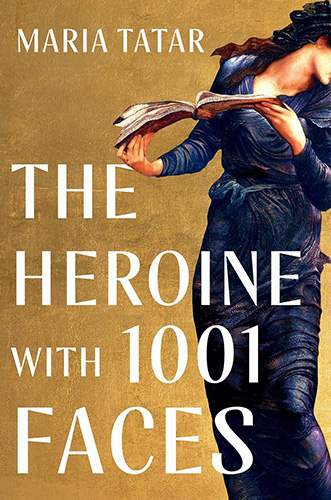Interview with Maria Tatar


Maria Tatar
author of "The Heroine with 1,001 Faces"

Michael Carter
Co-Host
Maria Tatar, author of "The Heroine with 1,001 Faces"
Maria Tatar's Website
Maria Tatar is the John L. Loeb Professor of Germanic Languages and Literatures. She chairs the Program in Folklore and Mythology at Harvard University, where she teaches courses in German Studies, Folklore, and Children’s Literature.
The daughter of Hungarian émigrés, Tatar has been fascinated since childhood by German culture and the Holocaust. “My parents had come from Europe and Europe was a place that signified really deep horror,” she says. “I grew up in the shadow of the Holocaust. In the 1950s, a lot of things like the diary of Anne Frank were appearing, and reports of the Nazi atrocities were coming out in the newspapers.”
The young Tatar also gravitated to the Grimm Brothers’ fairy tales—evoking adventure, glamour, and virtue, but also seething with violence, sadism, revenge, and horrific punishments—where the Teutonic “dark side” symbolically expressed itself. She wanted to understand how a culture that produced these enticing stories and the rapturous beauty of Beethoven, Wagner, and Goethe could also erupt in genocidal rage.
Her books include annotated editions of what she calls the “classics” (including “Little Red Riding Hood,” “Beauty and the Beast,” “Hansel and Gretel”) and of tales collected by the Grimms, an exploration of Bluebeard, and a new edition of the stories of Hans Christian Andersen
World-renowned folklorist Maria Tatar reveals an astonishing but long-buried history of heroines, taking us from Cassandra and Scheherazade to Nancy Drew and Wonder Woman.
The Heroine with 1,001 Faces dismantles the cult of warrior heroes, revealing a secret history of heroinism at the very heart of our collective cultural imagination. Maria Tatar, a leading authority on fairy tales and folklore, explores how heroines, rarely wielding a sword and often deprived of a pen, have flown beneath the radar even as they have been bent on redemptive missions. Deploying the domestic crafts and using words as weapons, they have found ways to survive assaults and rescue others from harm, all while repairing the fraying edges in the fabric of their social worlds. Like the tongueless Philomela, who spins the tale of her rape into a tapestry, or Arachne, who portrays the misdeeds of the gods, they have discovered instruments for securing fairness in the storytelling circles where so-called women’s work—spinning, mending, and weaving—is carried out.
Tatar challenges the canonical models of heroism in Joseph Campbell’s The Hero with a Thousand Faces, with their male-centric emphases on achieving glory and immortality. Finding the women missing from his account and defining their own heroic trajectories is no easy task, for Campbell created the playbook for Hollywood directors. Audiences around the world have willingly surrendered to the lure of quest narratives and charismatic heroes. Whether in the form of Frodo, Luke Skywalker, or Harry Potter, Campbell’s archetypical hero has dominated more than the box office.
In a broad-ranging volume that moves with ease from the local to the global, Tatar demonstrates how our new heroines wear their curiosity as a badge of honor rather than a mark of shame, and how their “mischief making” evidences compassion and concern. From Bluebeard’s wife to Nancy Drew, and from Jane Eyre to Janie Crawford, women have long crafted stories to broadcast offenses in the pursuit of social justice. Girls, too, have now precociously stepped up to the plate, with Hermione Granger, Katniss Everdeen, and Starr Carter as trickster figures enacting their own forms of extrajudicial justice. Their quests may not take the traditional form of a “hero’s journey,” but they reveal the value of courage, defiance, and, above all, care.
“By turns dazzling and chilling” (Ruth Franklin), The Heroine with 1,001 Faces creates a luminous arc that takes us from ancient times to the present day. It casts an unusually wide net, expanding the canon and thinking capaciously in global terms, breaking down the boundaries of genre, and displaying a sovereign command of cultural context. This, then, is a historic volume that informs our present and its newfound investment in empathy and social justice like no other work of recent cultural history.